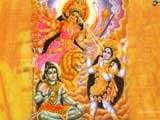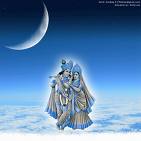The Hare Krishna mantra, also referred to reverentially as the Maha Mantra ("Great Mantra"), is a sixteen-word Vaishnava mantra which first appeared in the Kali-Santarana Upanishad, and which from the 15th century rose to importance in the Bhakti movement following the teachings of Chaitanya Mahaprabhu.
 Origin of Durga - The Mythology
Origin of Durga - The MythologyDurga, a beautiful warrior seated upon a tiger.
Devi is the great goddess of the Hindus,the consort of Shiva and she is worshiped in various forms corresponding to her two aspects: benevolence and fierceness. She is Uma, "light"; Gauri, "yellow or brilliant"; Parvati, "the mountaineer"; and Jagatmata, "the-mother-of-the-world" in her milder guise. The terrible emanations are Durga "the inaccessible"; Kali, "the black"; Chandi, "the fierce"; and Bhairavi, "the terrible."
Descent of the Goddess
Durga, a beautiful warrior seated upon a tiger, was the first appearance of the great goddess. The circumstance of her miraculous arrival was the tyranny of the monster-demon Mahishasur, who through terrific austerities had acquired invincible strength. The gods were afraid of this water-buffalo bull because neither Vishnu nor Shiva could prevail against him. It seemed that the joint energy of Shakti was only capable of vanquishing Mahisha, and so it was the eighteen-armed Durga who went out to do battle. Battlefield
She went to battle on her ferocious mount lion, armed with the weapons given to her by the other Gods. Durga is one of the angry and aggressive aspects of the goddess Shakti, whose role in Hindu mythology was to fight and conquer demons and also personify the Sakti or female aspect of any male deity. In the battle, she fought and killed the evil Mahishasura and restored heaven to the Gods. Since then the goddess is invoked for protection from the powers of evil. Durga Puja is observed in her honor, to celebrate her victory over evil.
Revered Mother
She has been worshiped from about 400 AD, but probably earlier, to the present. Her literary references are chiefly the Ramayana and Mahabharata, epic and Puranic texts, and she is mentioned by name in Vedic literature. In general, Durga is regarded in northern India as the gentle bride epitomizing family unity while in southern India she is revered more in her warrior aspect.











